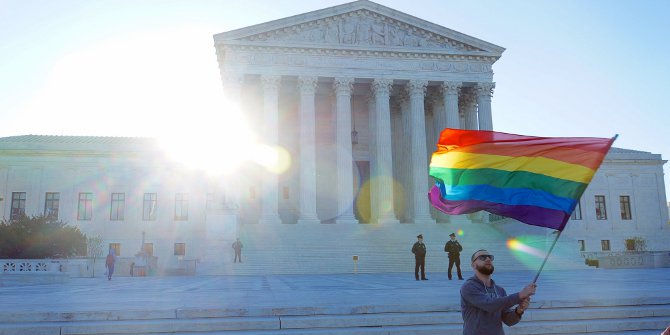
 In the last Presidential election, Latino voters had one of the largest gaps in turnout compared with White Americans. In new research, Peter L. Francia and Susan Orr find that despite the labor movement being written off by many commentators as a spent political force, union membership plays a significant role in increasing Latino voter registration and turnout. They argue that unions should continue to target Latinos; if union membership continues to decline, then their political participation will decline as well.
In the last Presidential election, Latino voters had one of the largest gaps in turnout compared with White Americans. In new research, Peter L. Francia and Susan Orr find that despite the labor movement being written off by many commentators as a spent political force, union membership plays a significant role in increasing Latino voter registration and turnout. They argue that unions should continue to target Latinos; if union membership continues to decline, then their political participation will decline as well.
Two of the largest turnout gaps in the 2012 U.S. Presidential election were between Latinos and black and white Americans, and between citizens earning less than $50,000 and those in higher income brackets. In new research, we find that if U.S. labor unions continue to reach out and organize Latino workers, they may alleviate these significant inequities. Our analysis shows that unions are particularly effective at mobilizing their Latino members, even though conventional wisdom often dismisses the U.S. labor movement as irrelevant in contemporary U.S. politics.
In a recent article published in the American Prospect, journalist Harold Meyerson aptly summarizes a prevailing perception of the U.S. labor movement as “the dinosaur finally shuffling off to the graveyard.” Meyerson warns that the consequences of the labor movement’s demise include the likelihood of exacerbating wage and wealth inequality in the United States. Our findings suggest that the decline of labor could threaten much more.
As many political analysts have observed, Latinos are the “sleeping giant” of U.S. politics. Despite being the fastest growing demographic in the United States, statistics indicate that they also have significantly lower voter turnout rates than other racial and ethnic groups. Latinos are 16 percent of the U.S. population, but comprised just 10 percent of the electorate in the 2012 U.S. election.
Although there have been sustained declines in union membership over many decades (with just 11.3 percent of wage and salary workers claiming membership in a union in 2013 compared to peak of about one-third of the workforce in the 1950s), the labor movement is the largest mass membership organization of women, African Americans, Latinos, and Asians in the United States. Indeed, despite a checkered history of integrating women and racial minorities into their ranks, unions have made particular efforts in recent years to reach out to Latinos through their support on such issues as immigrant rights and a living wage.

The strengthened ties between organized labor and the Latino community, and labor’s well-documented success in improving the civic skills and voter turnout of their members, led us to examine the question: Can the dinosaur awaken the sleeping giant? More specifically, we explored whether union affiliation increases both Latino voter registration and voter turnout. Of perhaps greater consequence, we also examined whether union affiliation has a larger substantive impact on Latino political participation than it does on non-Latinos. Until now, no study has explored whether a “union effect” on voting propensity is stronger for Latinos than for union members generally.
Our results show that unions play an especially significant role in increasing voter registration and turnout for Latinos. Some of our key findings include:
Latinos in union households were 7.2 percentage points more likely to register to vote and 4.9 percentage points more likely to vote than were Latinos not affiliated with a union (based on analysis of data from the Latino National Survey).
Latino union members were 5 percentage points more likely to register to vote and 6.9 percentage points more likely to vote compared to all eligible voters not affiliated with a union. By comparison, the “union effect” for non-Latinos was slightly smaller. Non-Latinos who belonged to a labor union were 3.7 percentage points more likely to register to vote and 4.2 percentage points more likely to vote than were non-union members (based on analysis of pooled data from the Current Population Survey, 2004-2010).
When we explored the data for each election cycle separately, we found that the impact of unions on their Latino members was stronger in more recent elections. In the presidential election of 2008, Latino union members were 7 percentage points more likely to register to vote and 8.2 percentage points more likely to vote, while non-Latino union members were 2.1 percentage points more likely to register to vote and 2.4 percentage points more likely to vote compared to non-union members (based on analysis of data from the Current Population Survey, 2008).
In the mid-term election of 2010, Latino union members were 5.9 percentage points more likely to register to vote and 11 percentage points more likely to vote, while non-Latino union members were 3.7 percentage points more likely to register to vote and 5.2 percentage points more likely to vote compared to non-union members (based on analysis of data from the Current Population Survey, 2010).
These results offer some promise for the future of the U.S. labor movement. If unions continue to reach out and organize a receptive Latino workforce, they will increase their ranks with just the kind of members among whom their political mobilization efforts are most effective. In addition, if more Latino workers join the ranks of organized labor, the U.S. electorate is likely to become more representative – no small matter given the concerns about political voice and equality that the American Political Science Association raised a decade ago (see its report, “Inequalities of Political Voice”).
Conversely, if organized labor continues to experience membership declines in the United States, then our findings suggest that there is more at stake than just the much-publicized issue of rising economic inequality. Such a development promises to create increased representational distortion in the political process by disproportionately dampening Latino political participation.
Our findings show that the larger issue of inequality in political voice that plagues U.S. elections is only likely to grow into the future if union membership continues to fall. This prospect brings to mind a quote from the great labor leader of the early 20th century, John L. Lewis, who once remarked that the “future of labor is the future of America.” If labor’s future is indeed bleak and headed the way of the dinosaur toward extinction, then so too might the future for a more representative democracy in the United States.
Please read our comments policy before commenting.
Note: This article gives the views of the author, and not the position of USApp– American Politics and Policy, nor of the London School of Economics.
Shortened URL for this post: http://bit.ly/1lsR0Bs
_________________________________
 Peter L. Francia – East Carolina University
Peter L. Francia – East Carolina University
Peter L. Francia is a Professor of Political Science at East Carolina University. He is the author of the book, The Future of Organized Labor in American Politics (Columbia University Press), and numerous articles and book chapters on the influence of the labor movement in U.S. politics.
_
 Susan Orr – The College at Brockport, State University of New York
Susan Orr – The College at Brockport, State University of New York
Susan Orr is an Associate Professor of Political Science at The College at Brockport. Her work on labor appears in the collection The Right and Labor in America : Politics, Ideology, and Imagination (University of Pennsylvania Press).






